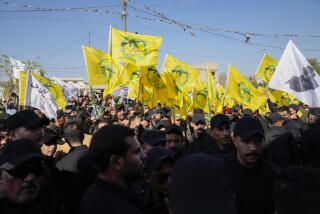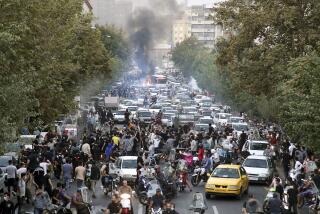Iran Helps Kurds in Iraq, Baghdad Official Says : Move Seen as Attempt to Divert Troops Fighting Tehran Forces on Main Front
- Share via
WASHINGTON — Iran has sharply increased its military support for Kurdish rebels in northern Iraq, hoping to divert Baghdad’s forces from the main front of the Persian Gulf War, according to a senior Iraqi official.
“We consider the actions of those (Kurdish) groups to be a fifth-column activity because they provide the Iranians with a better opportunity to carry out their own military effort,” said Nizar Hamdoon, Iraq’s deputy foreign minister.
Leading Strategy
Gary Sick, a former U.S. government expert on Iran, said that Tehran has placed support for the Kurds at the top of a new strategy intended to undermine Iraq from within. Sick, now deputy director of international affairs for the Ford Foundation, said that Iran hopes to capitalize on Iraq’s ethnic divisions to sap Baghdad’s strength in the seven-year-old war.
A Reagan Administration official said that intelligence reports from the Kurdish region are fragmentary. But he said it appears that Iraq has engaged in “very sharp” reprisals against Kurdish villages, apparently as a result of renewed rebel activity.
“We’ve had some people go up into Iraqi Kurdistan,” the official said. “There has been a tremendous amount of destruction of villages. It seems to be a scorched-earth policy by the Iraqis. That would tend to indicate, obviously, that there was reason for it.”
Iranian leaders have hinted at a renewed massive offensive in the region of Basra, Iraq’s second-largest city. If successful, such an attack would endanger Kuwait, the U.S.-backed city-state only a few miles from Basra on the Persian Gulf. A military diversion in the Kurdish region, hundreds of miles to the north, could contribute to the offensive by draining forces away from the front.
However, the Iranian offensive, originally anticipated this fall, has failed to materialize. A U.S. official said the attack could be launched in January, though the evidence remains fragmentary.
He said that Iran is taking preliminary military action that would be necessary to set the stage for an offensive. But he said it is too early to determine Tehran’s intentions. Iran staged a major offensive last year, led by human-wave attacks of fervent but ill-trained paramilitary Revolutionary Guards, but was unable to make significant territorial gains.
However, Sick said, Iran may be planning to destabilize the Kurdish region and aggravate other ethnic tensions in Iraq as an alternative to a conventional military attack.
Iraq’s war communiques have ignored the Kurdish region, apparently out of concern that discussion of the issue would encourage the rebels and damage civilian morale in the rest of Iraq. But Hamdoon readily confirmed that Iranian-backed Kurds have been waging a war with Iraqi troops for several months in the rugged mountains of the Iran-Iraq border region.
Hamdoon and Sick were interviewed during a Middle East seminar sponsored by former President Jimmy Carter this week in Atlanta.
Militias Fighting
The Iraqi official, who recently was promoted to deputy foreign minister after three years as ambassador to the United States, said that some regular Iraqi forces have been sent to the border area, though most of the fighting against the rebels is being carried out by local militias.
He predicted that the insurgency would collapse within days if the gulf war ended and if Iran withdrew its support. But he said the rebellion probably can continue as long as the war goes on.
In a note of deja vu , Sick said that the Kurdish rebellion is led by Massoud Barzani, the son of Mustafa Barzani, the leader of an insurgency that collapsed in 1975 after the United States and the late Shah Mohammed Rezi Pahlavi of Iran abruptly withdrew their support.
The elder Barzani, accompanied by 200,000 to 300,000 troops, was forced into exile, accusing then-Secretary of State Henry A. Kissinger and the shah of betrayal. He died in a Washington suburb in 1978, a bitter and broken man.
The House Intelligence Committee reported a decade ago that Mustafa Barzani and his backers were misled by Kissinger and other Nixon Administration officials. The United States gave the Kurdish rebels tens of millions of dollars in covert aid, ostensibly to destabilize the Iraqi regime, which had strong ties to the Soviet Union at the time.
However, the U.S. assistance was ended after the shah settled a border dispute with Iraq.
Hamdoon said that outside forces have stirred the Kurdish pot, off and on, for much of this century.
“Kurdish insurgency in the north of Iraq always gets active whenever there is an external factor advocating it,” he said. “Early in this century it was the British, then the shah, now (the Ayatollah Ruhollah) Khomeini.”
More to Read
Sign up for Essential California
The most important California stories and recommendations in your inbox every morning.
You may occasionally receive promotional content from the Los Angeles Times.













